A year ago I remembered the books I read in 2021, as I had done in some past years. Then in April, while I was laid up following surgery on an Achilles tendon, I wrote about the books I had read to that point in 2022. These included The Last King of America, Andrew Roberts’ biography of George III, which I was in the midst of at that time, Ulysses, Conrad’s Victory and Lord Jim, and some lighter fiction including a number of Rex Stout’s Nero Wolfe stories and C.J. Box’s latest Joe Pickett novel, Shadows Reel.
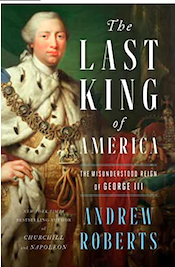 Since then, I finished Last King of America, and can’t recommend it highly enough. It is a sympathetic portrait of George III, whom Roberts portrays as a good man, a good king, but apparently an appallingly bad father. As you know, George reigned for a long time, bracketed by the American revolution and the Napoleonic Wars. It is fascinating to read an account of our revolution from the British point of view, and Last King conveys a great sense, better than anything else I have read, of how British politics worked in the 18th Century, an era when the King still had not inconsiderable powers.
Since then, I finished Last King of America, and can’t recommend it highly enough. It is a sympathetic portrait of George III, whom Roberts portrays as a good man, a good king, but apparently an appallingly bad father. As you know, George reigned for a long time, bracketed by the American revolution and the Napoleonic Wars. It is fascinating to read an account of our revolution from the British point of view, and Last King conveys a great sense, better than anything else I have read, of how British politics worked in the 18th Century, an era when the King still had not inconsiderable powers.
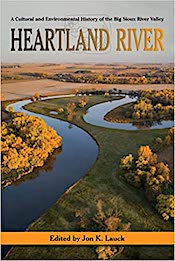 My friend Jon Lauck is a tireless historian of America’s Middle West. This year he edited Heartland River: A Cultural and Environmental History of the Big Sioux River Valley. The Big Sioux runs through my home town, Watertown, South Dakota, early in its path to the Missouri. Late in the summer I could sometimes jump across it, and I remember thinking, even then, that if this is the Big Sioux I would hate to see the Little Sioux. The book is a good compendium of local history and culture.
My friend Jon Lauck is a tireless historian of America’s Middle West. This year he edited Heartland River: A Cultural and Environmental History of the Big Sioux River Valley. The Big Sioux runs through my home town, Watertown, South Dakota, early in its path to the Missouri. Late in the summer I could sometimes jump across it, and I remember thinking, even then, that if this is the Big Sioux I would hate to see the Little Sioux. The book is a good compendium of local history and culture.
It includes a chapter on the literature of the Big Sioux River Valley, and I thought it would be fun to read a couple of the books described there. Wild Geese, written by Martha Ostenso and published in 1925, is set on a farm on the northern prairie. It is excellent, and largely forgotten today despite having twice been made into a Hollywood film. I also read Frederick Manfred’s rather famous pioneer novel Lord Grizzly, which I enjoyed less due to the unrelieved misery of its narrative.
Lauck has just published a major work of Midwestern history, The Good Country: A History of the American Midwest, 1800–1900, which I have begun and will write about when I have finished it.
As I have noted before, I haven’t been reading as much history as usual in the last few years, because whenever I am in my car I listen to history lectures produced by the Teaching Company’s Great Courses and available on Audible, which I can’t recommend highly enough. I have listened to nearly all of the courses on ancient, medieval and early modern history, and they are generally top-notch. The one I am currently listening to stands out: Ancient Mesopotamia: Life in the Cradle of Civilization, by Professor Amanda Podany. It conveys a great sense of what it was like to live 4,000 years ago. Fun fact: before becoming a historian, Podany played bass in the girl group that became the Bangles.
Generally I read very little contemporary (i.e., post-World War II) fiction. That changed somewhat in 2022. I saw an article about James Salter, a novelist and screenwriter of whom I was ignorant, and bought a couple of his books. Salter is often compared to John Updike, with good reason. I would describe Salter as colder and more eroticized than Updike, and 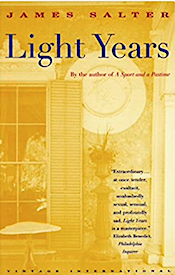 perhaps a more accomplished writer. Light Years chronicles the breakup of a marriage over a period of quite a few years. It is very good. A Sport and a Pastime, published in 1967, takes a deep dive into carnal envy. Critics have emphasized the unreliability of the narrator, but I don’t know: he is the only narrator we’ve got.
perhaps a more accomplished writer. Light Years chronicles the breakup of a marriage over a period of quite a few years. It is very good. A Sport and a Pastime, published in 1967, takes a deep dive into carnal envy. Critics have emphasized the unreliability of the narrator, but I don’t know: he is the only narrator we’ve got.
UPDATE: I forgot to mention All That Is, which follows the protagonist from the Navy in World War II through his career in the publishing industry into the 1980s. The narrative is about failed relationships and betrayals. It is interesting in several ways, but as always with Salter, what to make of it is up to you.
Amor Towles was an investment banker or something of the sort who retired after his first novel was commercially successful. My wife recommended A Gentleman In Moscow, the story  of a Russian nobleman who is prosecuted in the 1930s by the notorious Vyshynsky and, instead of being executed, is sentenced to permanent house arrest in Moscow’s Metropol Hotel. The novel covers many years; I enjoyed it thoroughly.
of a Russian nobleman who is prosecuted in the 1930s by the notorious Vyshynsky and, instead of being executed, is sentenced to permanent house arrest in Moscow’s Metropol Hotel. The novel covers many years; I enjoyed it thoroughly.
Towles’ first book, published in 2011, was Rules of Civility, which chronicles the social rise of a young woman beginning in the New York City of 1937. It is a terrific novel and justly made Towles famous.
Towles’ most recent work is The Lincoln Highway, the story of three young men, recently released or escaped from a reformatory, and a boy, who make their way across the country by car in 1954.
Towles’ books are all good, and they are very different. But they share an air of unreality, almost a fairy tale atmosphere in the case of A Gentleman In Moscow. This is least pronounced in Rules of Civility; you may or may not regard it as a defect.
I hadn’t read anything by Ernest Hemingway in many years, and had never read much by Scott Fitzgerald. So I read Fitzgerald’s This Side of Paradise, in my opinion a bit of juvenilia that probably should not have been published, and Tender is the Night, which I thought was great, better than the entertaining but over-rated Gatsby.
I re-read The Sun Also Rises, which is highly enjoyable although it sometimes verges on travelogue. A reasonable reader may wonder whether it is actually possible for people to drink so much. Hemingway and Faulkner did, more or less, and it ruined both of them in the end. I also read, I think for the first time, To Have and Have Not, which film director Howard Hawks described as Hemingway’s worst book, which was apt, although Hemingway had not yet written The Old Man and the Sea.
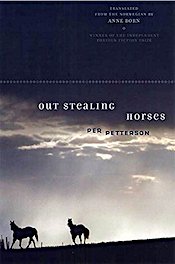 Out Stealing Horses is an excellent short novel by the Norwegian Per Petterson. An elderly Norwegian who attempts to live in seclusion is forced by a chance encounter to remember events of the summer of 1948 that blighted his life. I recommend it.
Out Stealing Horses is an excellent short novel by the Norwegian Per Petterson. An elderly Norwegian who attempts to live in seclusion is forced by a chance encounter to remember events of the summer of 1948 that blighted his life. I recommend it.
I continued reading Conrad as 2022 went on. In addition to Victory and Lord Jim, I read Under Western Eyes, set in pre-revolutionary Russia. It bears comparison, I think, with Dostoevsky.
As always, I read a lot of light fiction in 2022. Along with Shadows Reel, the latest Joe Pickett novel, my friend C.J. Box published Treasure State, the sixth volume in his Cassie Dewell series. Treasure State involves, among other things, an anonymous poet who launches a treasure hunt that turns deadly.
Michael Connelly has sold more books than just about anyone, for good reasons. In 2022 he published Desert Star, the fifth in his Renee Ballard series, which again features retired LAPD detective Harry Bosch. As always, it is good.
John D. Macdonald was extremely popular in my youth. Somewhat like Rex Stout, I regarded him as a bit downscale and had never read any of his Travis McGee books until a few months 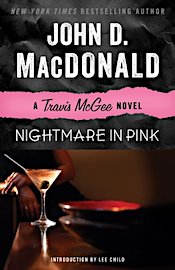 ago. McGee lives on a boat in Florida. He is not exactly a private detective, just a guy who helps his friends, who seem always to be getting into trouble. I read six MacDonald novels, all from relatively early in the McGee series, and all with a color in the title. MacDonald is a guilty pleasure. His hero’s enviable romantic life, which is described in a manner somewhat reminiscent of Ian Fleming–a manner that would not be possible today–necessitates getting rid of a woman or two in each volume. Start reading MacDonald at your peril. I no doubt will read more.
ago. McGee lives on a boat in Florida. He is not exactly a private detective, just a guy who helps his friends, who seem always to be getting into trouble. I read six MacDonald novels, all from relatively early in the McGee series, and all with a color in the title. MacDonald is a guilty pleasure. His hero’s enviable romantic life, which is described in a manner somewhat reminiscent of Ian Fleming–a manner that would not be possible today–necessitates getting rid of a woman or two in each volume. Start reading MacDonald at your peril. I no doubt will read more.
Georges Simenon and Agatha Christie are two of the world’s great crime novelists. Unfortunately, 2022 was the year when I ran out of books by both. Simenon wrote 75 novels featuring Inspector Maigret of the Paris police. I can’t recommend them too highly; among other things, you learn a lot about France. I read the last of the Maigret books last year.
Likewise with Agatha Christie. I was down to a few of her least well-known murder mysteries and, worse, a few spy novels that were frankly not good. So I re-read The Murder of Roger Ackroyd, one of the most justly renowned murder mysteries ever written. If you haven’t read it, you should.
 Brad Thor is always a step ahead of the news headlines. In Rising Tiger, the 21st in Thor’s Scot Harvath series, the apparently immortal Harvath travels to India and battles the Red Chinese. As I have said before about Thor, he ain’t Shakespeare, but, as with all popular thriller writers, there is good reason why his books are so popular.
Brad Thor is always a step ahead of the news headlines. In Rising Tiger, the 21st in Thor’s Scot Harvath series, the apparently immortal Harvath travels to India and battles the Red Chinese. As I have said before about Thor, he ain’t Shakespeare, but, as with all popular thriller writers, there is good reason why his books are so popular.
I like to read books by my friends. In addition to those noted above, Garrett Murch, a former Senate staffer who now lives in his native Maine, wrote his first novel, Ezzy’s Education. Ezzy’s Education is a political satire set in the context of a high school election. Both woke culture and Trumpism are parodied in entertaining fashion.
Now it is on to 2023.
Notice: All comments are subject to moderation. Our comments are intended to be a forum for civil discourse bearing on the subject under discussion. Commenters who stray beyond the bounds of civility or employ what we deem gratuitous vulgarity in a comment — including, but not limited to, “s***,” “f***,” “a*******,” or one of their many variants — will be banned without further notice in the sole discretion of the site moderator.